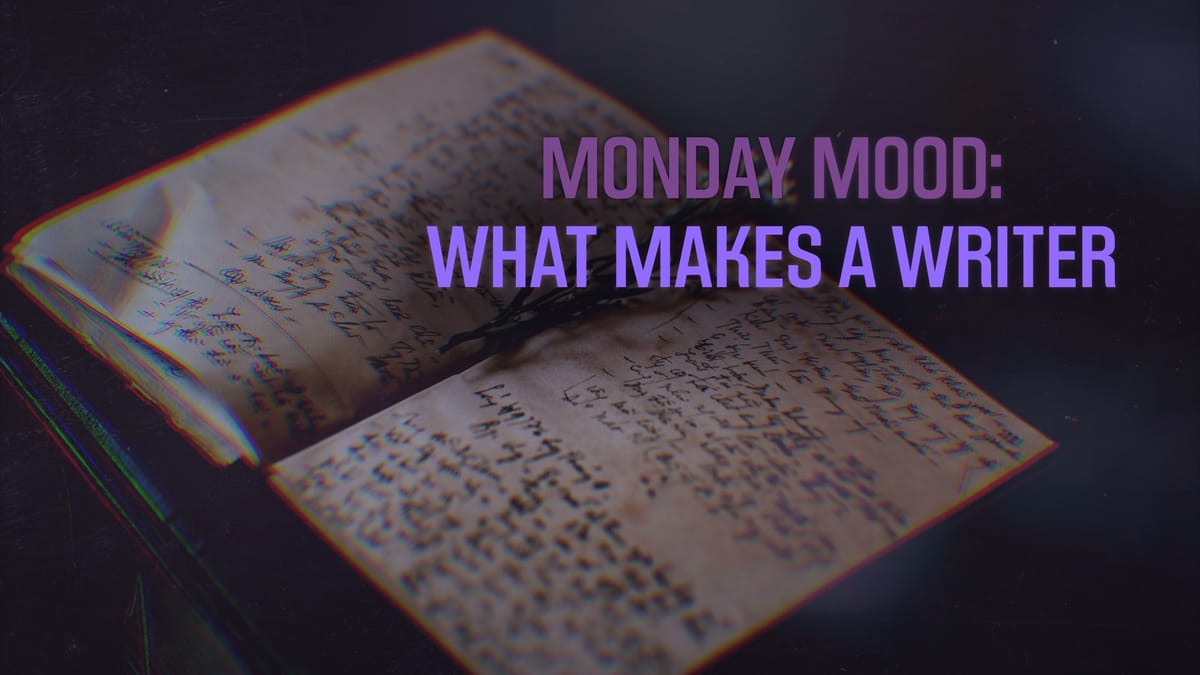Monday Mood: What Makes a Writer
Writing has always been a part of my life, but never the focus. It’s a means to an end — the practical sister to imagining, a way to get thoughts out of my head and into something that can be understood.

By: Violet McCleod, Madeline
Writing has always been a part of my life, but never the focus. It’s a means to an end — the practical sister to imagining, a way to get thoughts out of my head and into something that can be understood. I don’t romanticize it. I don’t crave it. Most of the time, it feels more like translating thoughts into words than creating.
I do love writing, in my own way. But ink isn’t in my veins. The words don’t spill out of me in a flurry of inspiration. Everything is measured, revised, thought out before it even reaches the page. I edit as I go; not just in the draft, but in my mind, before the draft even begins. I don’t write from a place of abandon. I write from precision. And for a long time, I worried that meant I wasn’t doing it right.
I’ve wondered if that made me less of a writer. If loving structure more than spontaneity, or outcomes more than process, meant I was missing the point. I don’t keep journals. I don’t write every day. I’m not pulled toward the page like it’s a compulsion. I write for the story — not for the act itself.
But that doesn’t make it less real.
The way I build characters out of quiet moments, the way I loop meaning through structure and tension, the way I shape emotional arcs until they land just right… that is a form of art. Maybe it doesn’t look like scribbled notebooks or midnight poems, but it’s still storytelling. It’s still deliberate. It still moves people. It still counts.
We talk a lot about what makes someone a “real writer.” How often they write. How naturally it comes to them. How much they love the process. But the truth is, none of that is a requirement. Some of us write with joy, some with discipline. Some for the story, some for the act. And all of it is valid.
If you’re someone who hesitates to call yourself a writer because you think you haven’t earned it, maybe take a step back. “Writer” isn’t a badge someone else gives you. It’s a role you step into. A craft you shape around your own voice and values.
You don’t have to love the process. You don’t have to do it every day. You don’t have to look or sound like anyone else. You just have to mean what you say.
And that’s enough.
"The Contagion Suite" - Original Composition (Doctor Who: The Extinction Factor)
On a similar note, I sometimes struggle to come to terms with the idea of being a “composer.” The word carries a somewhat antiquated connotation compared to other roles in the music industry, such as “songwriter” or “producer,” which I’ve always felt is a bit of a shame. That distinction has often made it harder for me to fully embrace the title for myself.
At times, though, that discomfort can become a source of inspiration. There’s something empowering about wearing the label with pride, especially when I’m working on a project or writing music purely for the joy of it. Claiming the role while reshaping what it means on my own terms feels far more rewarding than letting the word define me.
“The Contagion Suite” is a piece where I chose to lean fully into what the title “composer” means to me. Within the structure of a scoring project, I set out to write a traditional four-movement symphonic suite, drawing from a range of genres in the spirit of classical composers. Writing it became an experience of creative ownership, a moment where I stopped hesitating and allowed myself to step into the role without apology. Since then, I’ve found it easier to define myself not just as a creative, but as a composer in the fullest sense.
Thanks so much for reading. Ember & Ink runs on community support — if you’d like to help us keep creating, you can leave a tip on Ko-Fi or reach out for marketing, design, voice work, and more.
